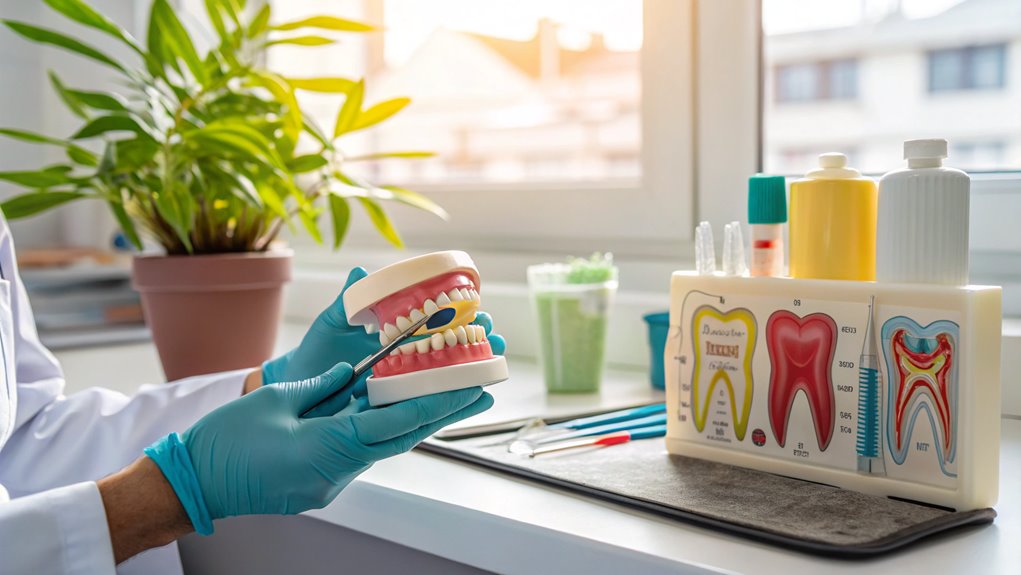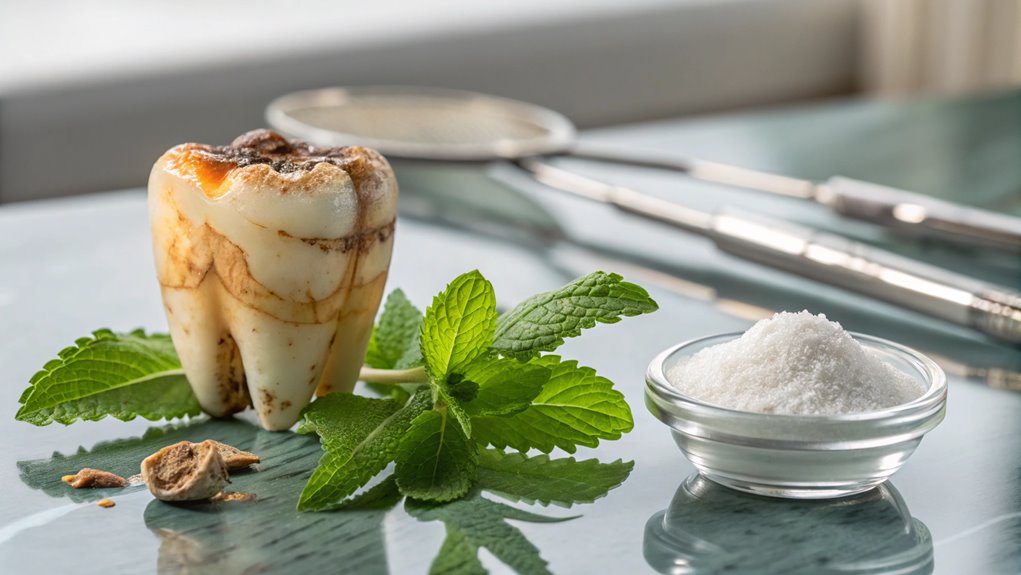Tooth decay might seem like a straightforward issue, but did you know that it's not always about sugar? Surprisingly, factors like acidic foods, dry mouth, and even teeth grinding play a significant role. If you're worried about cavities, there are fascinating remedies and solutions available that you might not have considered, such as oil pulling or homemade toothpaste. Even for advanced cases, treatments like laser dentistry and ozone therapy offer promising results. But what's truly vital is understanding how you can prevent decay in the first place. Curious about these preventative strategies and more? There's much to uncover about keeping your smile healthy.
Key Takeaways
- Tooth decay is the most common chronic disease affecting both children and adults worldwide.
- Acidic foods and drinks can erode enamel, increasing the risk of tooth decay.
- Oil pulling with coconut oil and homemade toothpaste can help reduce harmful bacteria and plaque.
- Advanced treatments like laser dentistry offer less invasive decay removal and promote comfort.
- Regular dental check-ups and good oral hygiene practices can prevent decay and maintain oral health.
Surprising Causes of Tooth Decay

While you might think sugary snacks are the main culprits of tooth decay, there are actually several surprising causes that often go unnoticed. One such cause is acidic foods and drinks. Citrus fruits, tomatoes, and even healthy options like sports drinks can erode enamel if consumed excessively.
You might enjoy them for their health benefits or invigorating taste, but it's essential to moderate their intake and rinse your mouth with water afterward.
Another hidden factor is dry mouth. Saliva plays an important role in neutralizing acids and washing away food particles. If you're experiencing dry mouth due to medications or health conditions, it can increase your risk of tooth decay.
Chewing sugar-free gum or staying hydrated can help stimulate saliva production, providing some protection for your teeth.
Lastly, teeth grinding, often occurring during sleep, can wear down enamel over time. This condition, known as bruxism, may contribute to decay by weakening your teeth.
If you notice signs of grinding, like headaches or jaw pain, consult your dentist about a nightguard to protect your teeth.
Understanding these surprising causes empowers you to make informed choices for your dental health, ensuring a brighter smile.
Uncommon Tooth Decay Facts
Did you know that tooth decay is the most common chronic disease among both children and adults, yet it's often misunderstood? While most people are aware of the role sugar plays in cavities, you might be surprised to learn that tooth decay can also result from conditions like dry mouth or even sinus infections.
When your mouth doesn't produce enough saliva, it can't effectively wash away food particles, leading to a higher risk of decay.
Another uncommon fact is that tooth decay isn't always visible. Hidden cavities can develop between teeth or under the gum line, making regular dental check-ups essential. Additionally, not all cavities cause pain initially. You can have a cavity without feeling any discomfort, which is why it's important to maintain routine dental visits.
Interestingly, diet plays a bigger role than just sugar intake. Frequent snacking or sipping on acidic drinks can weaken your enamel over time. Even healthy snacks like fruits can contribute if not managed properly.
Finally, did you know that some medications can contribute to tooth decay? Certain prescriptions cause dry mouth, which, as mentioned, increases decay risk. Always consult your dentist if you notice changes in your oral health.
Innovative Home Remedies

Despite the common perception that professional dental care is the only solution, innovative home remedies can also play a significant role in managing tooth decay. You might be surprised to learn that simple ingredients found in your kitchen can help maintain your oral health.
For instance, oil pulling with coconut oil is a time-tested practice. Swishing a tablespoon of coconut oil in your mouth for 15-20 minutes can reduce harmful bacteria, helping to prevent cavities.
Another effective remedy is using a homemade toothpaste made from baking soda and hydrogen peroxide. This combination gently removes plaque and whitens teeth. Mix equal parts of both ingredients, and brush with it a few times a week for best results. It's a natural way to keep your teeth clean and healthy.
Don't underestimate the power of herbs and spices. Clove oil is known for its antimicrobial properties. A drop on a cotton ball applied to a painful area can provide relief.
Similarly, chewing on guava leaves can help reduce inflammation and fight bacteria.
Advanced Treatment Options
When it comes to battling tooth decay, advanced treatment options offer promising solutions that go beyond traditional methods.
These cutting-edge approaches can save your teeth and restore your smile with less pain and more efficiency.
Let's explore some of the most effective advanced treatments available today.
- Laser Dentistry: This innovative technique uses focused light beams to remove decay with pinpoint precision.
It's less invasive than traditional drilling, reducing discomfort and recovery time.
Plus, it can minimize bleeding and the need for anesthesia.
- Ozone Therapy: Ozone gas is applied to the affected area, effectively killing bacteria that cause decay.
This treatment not only halts the progression of cavities but can also promote the remineralization of damaged enamel.
It's a gentle option for those looking to avoid more aggressive procedures.
- Biocompatible Fillings: Traditional amalgam fillings contain mercury, but biocompatible materials like composite resins or glass ionomers offer a safer alternative.
They bond better with teeth and blend naturally with your tooth color, providing both safety and aesthetics.
These advanced methods provide you with more options, better outcomes, and a brighter, healthier smile.
Always consult your dentist to determine the best treatment for your unique dental needs.
Preventative Strategies

While tooth decay is a common concern, effective preventative strategies can greatly reduce your risk and safeguard your oral health.
Start by brushing your teeth at least twice a day with fluoride toothpaste. Fluoride strengthens tooth enamel and helps fight off bacteria that cause decay. Don't forget to floss daily to remove plaque and food particles that your toothbrush might miss.
Regular dental check-ups are essential. Your dentist can spot early signs of decay and offer professional cleanings that keep your mouth healthy. They might also suggest sealants or fluoride treatments for added protection.
Pay attention to your diet, as it plays a significant role in oral health. Limit sugary snacks and drinks, as sugar fuels the bacteria that lead to decay. Instead, opt for tooth-friendly foods like crunchy fruits and vegetables, which stimulate saliva and help clean your teeth.
Staying hydrated is also key. Water washes away food particles and keeps saliva levels high, further protecting your teeth.
If you're a smoker, consider quitting. Smoking not only stains your teeth but also increases the risk of decay and gum disease.
Frequently Asked Questions
Can Tooth Decay Affect Your Overall Health?
Tooth decay can indeed affect your overall health. When you don't address it, bacteria from the decay might enter your bloodstream, potentially leading to infections elsewhere in your body.
It can also increase the risk of heart disease, diabetes complications, and respiratory issues. You've got to pay attention to dental health to prevent these risks.
Taking proactive steps, like regular brushing and dental check-ups, can help you maintain both oral and overall health.
Is Tooth Decay Reversible With Natural Methods?
You might wonder if tooth decay is reversible with natural methods.
While you can't completely reverse decay once it's reached the dentin, you can halt and even remineralize early enamel damage.
Focus on a diet rich in calcium and phosphorus and practice good oral hygiene.
Using fluoride toothpaste and rinses can help too.
Regular dental check-ups confirm any decay is caught early, giving you the best chance to maintain your smile.
What Role Do Genetics Play in Tooth Decay?
You might wonder how genetics impact tooth decay. Well, they play a significant role. Your genes can determine your enamel strength, saliva composition, and even how your teeth align, all influencing decay risk.
But don't worry, even if you're genetically predisposed, you can actively reduce decay chances. Practicing good oral hygiene, regular dental check-ups, and making informed dietary choices can help you maintain a healthy smile despite genetic factors.
How Does Diet Beyond Sugar Impact Tooth Decay?
You might think sugar is the main culprit in tooth decay, but your diet's impact goes beyond that.
Acidic foods and drinks, like citrus and soda, erode enamel, making teeth vulnerable. Starchy foods, such as bread and pasta, break down into sugars, feeding harmful bacteria.
Don't worry, though. By balancing your diet with plenty of water, calcium-rich foods, and fiber, you can protect your teeth and maintain a healthy smile.
Can Tooth Decay Occur Without Visible Cavities?
Yes, tooth decay can occur without visible cavities. You mightn't see any holes, but decay can still be happening beneath the surface.
It's important to remember that bacteria and acids can start breaking down enamel before any visible signs appear.
Regular dental check-ups and good oral hygiene are key. Don't worry too much; by brushing, flossing, and visiting your dentist, you can catch decay early and keep your smile healthy.
Conclusion
You've learned that tooth decay isn't just about sugar; it's influenced by surprising factors like acidic foods and teeth grinding. But don't worry—there are innovative remedies like oil pulling and advanced treatments like laser dentistry to help you. Remember, prevention is your best defense. By brushing, flossing, and visiting your dentist regularly, you can maintain a healthy smile. You're taking the right steps toward better oral health, and that's something to feel good about!
